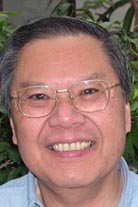
Dr. Cyril Thong has taught as a Senior Lecturer at Simon Fraser University for more than 28 years. He received an "Excellence in Teaching" award in 2004. Click here to read more about it.
Teaching Philosophy
The very best teacher I ever had was in Grade 9. It was towards the end of a grueling Math test. I had one more trigonometric problem to solve but after staring at the diagram in the question for several minutes, the solution was still not apparent. The teacher, who was strolling down the aisles of the exam room noted my confusion. He walked up to my table and rotated my exam paper 90 degrees. Immediately, the solution jumped out at me and I completed the question without further hesitation. This teacher taught me an important lesson that stayed with me for many years after - problems can be solved if we learn to look at them in different ways. As teachers we should try different "angles" to achieve understanding in our students.
I have taught the 1st year Biology program at SFU for 28 years to more than 12,000 students. Most of my students are recent High School graduates and many come unprepared for the rigors of university. High school students excel at learning facts and memorizing these for exam purposes. The "wider picture" or "concepts" in Biology are frequently lost or poorly taught. I remember tutoring a Grade 12 Biology student, a friend of my son's. She could regurgitate the sequence of reactions in the breakdown of glucose by the cell but could not tell me the functions of Krebs Cycle in the process. The course I teach most frequently is a "form and function" course, and although it contains a lot of factual information, I try to emphasize the understanding of the processes that occur in living organisms. I believe that the understanding of process makes memorization of the facts easier. One needs a skeleton on which to hang muscle.
This leads to my second teaching strategy, which is the use of familiar analogies to teach difficult concepts. Many processes are so abstract to the untrained mind that students have difficulties "picturing" how they operate. Familiar analogies "switch on" the "lights" of comprehension. One of my favorite analogies is equating the importance of DNA in cellular information transfer with a library where books cannot be taken out. Another is equating the capture of free energy of electrons with holding on to an energized child. Interestingly, the Grade 12 student I mentioned before still remembers the DNA/library analogy to this day, nearly seven years later. To see a student's eyes light up with the comprehension of a difficult concept or process still gives me goose bumps and it is a reward in itself. I hope I will never lose this reaction.
Another teaching strategy I employ is to ask leading questions in labs to enable students to come up with the correct answers by themselves. Much of learning is deductive and cumulative. If a solution is arrived at through the use of logical deduction and one's accumulated knowledge from past experiences, there is a good chance that the resulting understanding will be retained and the learning experience enriched. It is also a tremendous boost to their self-confidence if students are able to arrive at the answers on their own.
Students respond to instructors when they know they care. One small effort on my part has been to try to remember names, which can be difficult when one's class enrollments are nearly always over 300. In the 1970's and 1980's when enrollments were below 250 per semester, I could attach a name to a face for about 80% of my students. When enrollments exceeded this level in the 1990's, I gave up trying to know all my students (it may also be a reflection of my aging mind). Now I probably recognize most of them by face or by name and only about 25% of them by both. It is a sad result of our overcrowded classes. I also practice an open door policy to my students - I am always available for student consultations during working hours.
I have been asked whether I have become bored with teaching the same 1st year course over so many years. I view every new batch of students as a new challenge. Every student is receptive to a particular teaching style and so I am constantly refining the way I teach. Being familiar with the material I have to teach is not the same as being able to teach that material to a new class every semester. If I can analogize this, it's like the ad on TV for the snack food called "Bits and Bites" where the character in the ad says, "Every new handful is a different taste sensation".
In the 1980's I realized that many first year students were having difficulties adjusting to university after high school. I wrote an article entitled "A Survival Kit for First Year Students Especially in the Sciences" and circulated it to all my students. In later years, this article was adopted by Freshman Orientation at SFU and included in their booklet entitled "Making the Grade". In this article I proposed several behavioral adjustments and study strategies to help first year students adapt to university. Over the years several students have commented to me that the article was instrumental in helping them survive the transition from high school to university. I am gratified that it has achieved its purpose.
Cyril Thong, Ph.D.
Senior Lecturer
Department of Biological Sciences
|